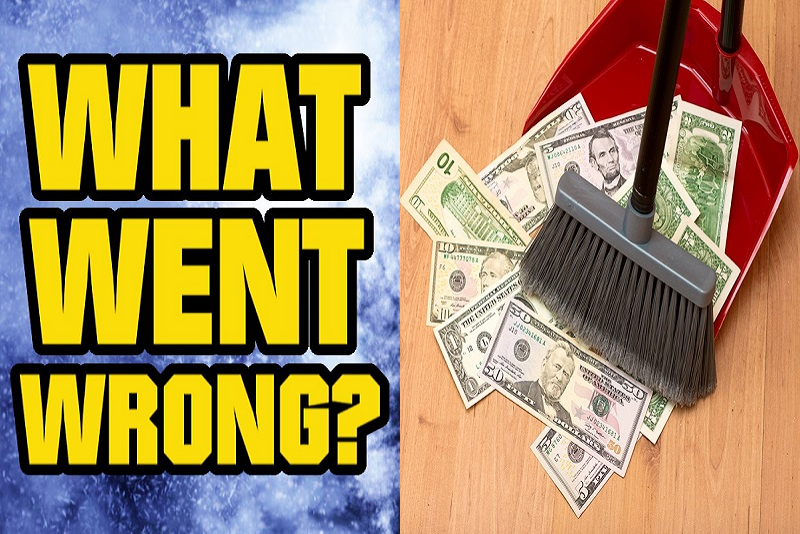BROWSE BY TOPIC
- Bad Brokers
- Compliance Concepts
- Investor Protection
- Investments - Unsuitable
- Investments - Strategies
- Investments - Private
- Features/Scandals
- Companies
- Technology/Internet
- Rules & Regulations
- Crimes
- Investments
- Bad Advisors
- Boiler Rooms
- Hirings/Transitions
- Terminations/Cost Cutting
- Regulators
- Wall Street News
- General News
- Donald Trump & Co.
- Lawsuits/Arbitrations
- Regulatory Sanctions
- Big Banks
- People
TRENDING TAGS
Stories of Interest
- Sarah ten Siethoff is New Associate Director of SEC Investment Management Rulemaking Office
- Catherine Keating Appointed CEO of BNY Mellon Wealth Management
- Credit Suisse to Pay $47Mn to Resolve DOJ Asia Probe
- SEC Chair Clayton Goes 'Hat in Hand' Before Congress on 2019 Budget Request
- SEC's Opening Remarks to the Elder Justice Coordinating Council
- Massachusetts Jury Convicts CA Attorney of Securities Fraud
- Deutsche Bank Says 3 Senior Investment Bankers to Leave Firm
- World’s Biggest Hedge Fund Reportedly ‘Bearish On Financial Assets’
- SEC Fines Constant Contact, Popular Email Marketer, for Overstating Subscriber Numbers
- SocGen Agrees to Pay $1.3 Billion to End Libya, Libor Probes
- Cryptocurrency Exchange Bitfinex Briefly Halts Trading After Cyber Attack
- SEC Names Valerie Szczepanik Senior Advisor for Digital Assets and Innovation
- SEC Modernizes Delivery of Fund Reports, Seeks Public Feedback on Improving Fund Disclosure
- NYSE Says SEC Plan to Limit Exchange Rebates Would Hurt Investors
- Deutsche Bank faces another challenge with Fed stress test
- Former JPMorgan Broker Files racial discrimination suit against company
- $3.3Mn Winning Bid for Lunch with Warren Buffett
- Julie Erhardt is SEC's New Acting Chief Risk Officer
- Chyhe Becker is SEC's New Acting Chief Economist, Acting Director of Economic and Risk Analysis Division
- Getting a Handle on Virtual Currencies - FINRA
ABOUT FINANCIALISH
We seek to provide information, insights and direction that may enable the Financial Community to effectively and efficiently operate in a regulatory risk-free environment by curating content from all over the web.
Stay Informed with the latest fanancialish news.
SUBSCRIBE FOR
NEWSLETTERS & ALERTS
Another Broker-Dealer Nabbed in FINRA Mutual Fund Sweep
by Howard Haykin
Between January 2011 and March 2016, ProEquities (with its 1,051 registered reps and 531 branch offices) disadvantaged certain retirement plan and charitable organization customers that were eligible to purchase Class A shares in certain mutual funds without a front-end sales charge ("Eligible Customers"). These Eligible Customers were instead sold Class A shares with a front-end sales charge or Class B or C shares with back-end sales charges and higher ongoing fees and expenses. By its own estimates, ProEquities overcharged eligible customers by approximately $137,000 (and including implied interest, the firm owed these customers $158,000).
According to FINRA, ProEquities had relied on its financial advisors to determine the applicability of sales charge waivers – in the absence of reasonable written policies or procedures to assist financial advisors in making this determination. As a result, ProEquities violated NASD Conduct Rule 3010 (prior to 12/1/14), FINRA Rule 3110 (on or after 12/1/14), and FINRA Rule 2010.
PROEQUITIES AVOIDED A FINE AND OTHER SANCTIONS. FINRA typically applies severe sanctions to firms that are repeat offenders – i.e., that have a ‘Relevant Disciplinary History’. Yet, that didn't happen to ProEquities which, in November 2015, settled FINRA charges that it failed to apply sales charge discounts to certain customers' eligible purchases of unit investment trusts. In that case, ProEquities agreed to pay a fine of $165,000 and restitution to customers $110,000.
► ProEquities' Investigation in This Case. In October 2015, ProEquities advised FINRA it was undertaking a review to determine whether it provided available sales charge waivers to Eligible Customers. By July 2016, ProEquities determined that approximately 350 of its customer accounts had been disadvantaged on mutual fund share purchases, and were overcharged by more than $136,000.
► Other Factors. FINRA credits ProEquities with representing that it will ensure that retirement and charitable waivers are appropriately applied to all future transactions. FINRA further recognizes ProEquities for its ‘extraordinary cooperation’ in:
- initiating an investigation to identify whether Eligible Customers received sales charge waivers during the Relevant Period;
- undertaking a self-review of Eligible Customer accounts, before FINRA initiated its investigation;
- providing restitution to Eligible Customers for the relevant period;
- promptly establishing a plan of remediation for Eligible Customers who did not receive appropriate sales charge waivers; and,
- promptly taking action and remedial steps to correct the violative conduct, including programming changes to preclude ongoing customer harm while the Firm instituted permanent systems upgrades.
FINANCIALISH NOTE: It's altogether clear or apparent from FINRA's write-up that ProEquities, in actuality, self-reported its violative conduct and initiated its investigation without prompting or 'nudge' from FINRA. That said, Financialish is willing to accept FINRA's statements on face value.
This case was reported in FINRA Disciplinary Actions for May 2019.
For further details, click on... FINRA AWC #2016052179401.





